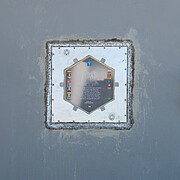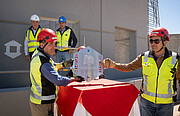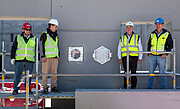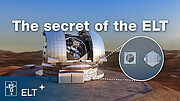Mitteilung
Zeitkapsel im Extremely Large Telescope der ESO vergraben
16. Oktober 2023
Letzte Woche wurde im Rahmen einer Zeremonie auf der Baustelle des Extremely Large Telescope (ELT) der ESO auf dem Cerro Armazones in der chilenischen Atacama-Wüste eine Zeitkapsel vergraben, um das Personal, die Wissenschaft, die Technologie und die Zusammenarbeit zwischen der ESO und Chile zu ehren.
Die Kapsel wurde bei der Grundsteinlegung im Jahr 2017 versiegelt, als mit dem Bau des bald „weltgrößten Auges am Himmel“ begonnen wurde. Als symbolische Botschaft an zukünftige Generationen enthält sie Erinnerungsstücke der chilenischen Behörden, darunter eine Gedenktafel der damaligen Präsidentin Chiles, Michelle Bachelet Jeria, über die Öffnung des Landes-Himmels für die Fragen eines ganzen Planeten sowie Zeichnungen von chilenischen Kindern, die das Universum darstellen, ESO-Teleskope und Landschaften im Norden Chiles. Die Kapsel enthält außerdem ein Mosaik aus Fotos von ESO-Mitarbeiter*innen und eine Kopie eines Buches, das die zukünftigen wissenschaftlichen Ziele des Teleskops beschreibt [1]. Darauf befindet sich ein graviertes Sechseck aus Zerodur®, ein Modell eines der Hauptspiegelsegmente des ELT im Maßstab 1:5.
Letzte Woche besuchten Mitglieder des ESO-Rats und ESO-Mitarbeiter*innen den ELT-Standort, um die Kapsel in der Wand der ELT-Kuppel zu vergraben. Die Veranstaltung wurde von ESO-Ratspräsidentin Linda Tacconi (Deutschland) und Vizepräsidentin Mirjam Lieshout-Vijverberg (Niederlande) geleitet. In einer weiteren Veranstaltung wenige Tage später brachte eine zweite Gruppe von Ratsmitgliedern unter der Leitung von Rafael Bachiller (Spanien) und Jan Buriánek (Tschechien) eine Gedenktafel an der Wand an, in der die Kapsel vergraben ist.
Vor kurzem war der Bau des ELT zu 50% abgeschlossen, und man ist auf dem besten Weg, später in diesem Jahrzehnt mit dem wissenschaftlichen Betrieb zu beginnen. Dieser Meilenstein findet in dem Jahr statt, in dem die ESO und Chile ihrer 60-jährigen Partnerschaft gedenken, die die Einrichtung einzigartiger Observatorien in der Atacama-Wüste und die Entwicklung einer starken wissenschaftlichen Gemeinschaft ermöglicht hat.
Als größtes Teleskop der Welt für das sichtbare und das infrarote Licht wird das ELT unser Verständnis des Universums verändern. Seine wissenschaftlichen Ziele reichen vom Sonnensystem bis zum Rand des beobachtbaren Universums, einschließlich Exoplaneten, Schwarzen Löchern und den ersten Sternen und Galaxien. Es wird nach Antworten auf einige der größten offenen Fragen der Astronomie suchen: Gibt es anderswo im Universum Leben? Was ist die Natur von dunkler Materie und dunkler Energie? Sind die Naturgesetze universell? Es könnte auch noch unbekannte Fragen beantworten – wer weiß, was das ELT entdeckt haben wird, wenn die Kapsel geöffnet wird?
Endnoten
[1] Der genaue Inhalt der ELT-Zeitkapsel ist:
- Eine gravierte Glastafel der damaligen chilenischen Präsidentin Michelle Bachelet Jeria mit dem Zitat „Abriendo el cielo de Chile a las preguntas de todo un planeta“ [„Den Himmel Chiles für die Fragen eines ganzen Planeten öffnen]
- Ein Gedenkstift der chilenischen Regierung (Regionalregierung der Region Antofagasta)
- Sechs Zeichnungen von Schulkindern aus Antofagasta und Taltal, die Landschaften im Norden Chiles, astronomische Objekte und ESO-Teleskope zeigen
- Zwei Collagen mit Fotos von ESO-Mitarbeiter*innen
- Ein Fotobuch über die Atacama-Wüste
- Ein Buch über die Wissenschaft mit dem ELT: An Expanded View of the Universe
Links
Links
- Aktuelle Neuigkeiten zum ELT
- ELT-FAQ-Seite
- Bilder und Videos vom ELT
Kontaktinformationen
Bárbara Ferreira
ESO Media Manager
Garching bei München
Tel: 089 3200 6670
E-Mail: press@eso.org
Über die Mitteilung
| ID: | ann23017 |
Our use of Cookies
We use cookies that are essential for accessing our websites and using our services. We also use cookies to analyse, measure and improve our websites’ performance, to enable content sharing via social media and to display media content hosted on third-party platforms.
ESO Cookies Policy
The European Organisation for Astronomical Research in the Southern Hemisphere (ESO) is the pre-eminent intergovernmental science and technology organisation in astronomy. It carries out an ambitious programme focused on the design, construction and operation of powerful ground-based observing facilities for astronomy.
This Cookies Policy is intended to provide clarity by outlining the cookies used on the ESO public websites, their functions, the options you have for controlling them, and the ways you can contact us for additional details.
What are cookies?
Cookies are small pieces of data stored on your device by websites you visit. They serve various purposes, such as remembering login credentials and preferences and enhance your browsing experience.
Categories of cookies we use
Essential cookies (always active): These cookies are strictly necessary for the proper functioning of our website. Without these cookies, the website cannot operate correctly, and certain services, such as logging in or accessing secure areas, may not be available; because they are essential for the website’s operation, they cannot be disabled.
Functional Cookies: These cookies enhance your browsing experience by enabling additional features and personalization, such as remembering your preferences and settings. While not strictly necessary for the website to function, they improve usability and convenience; these cookies are only placed if you provide your consent.
Analytics cookies: These cookies collect information about how visitors interact with our website, such as which pages are visited most often and how users navigate the site. This data helps us improve website performance, optimize content, and enhance the user experience; these cookies are only placed if you provide your consent. We use the following analytics cookies.
Matomo Cookies:
This website uses Matomo (formerly Piwik), an open source software which enables the statistical analysis of website visits. Matomo uses cookies (text files) which are saved on your computer and which allow us to analyze how you use our website. The website user information generated by the cookies will only be saved on the servers of our IT Department. We use this information to analyze www.eso.org visits and to prepare reports on website activities. These data will not be disclosed to third parties.
On behalf of ESO, Matomo will use this information for the purpose of evaluating your use of the website, compiling reports on website activity and providing other services relating to website activity and internet usage.
Matomo cookies settings:
Additional Third-party cookies on ESO websites: some of our pages display content from external providers, e.g. YouTube.
Such third-party services are outside of ESO control and may, at any time, change their terms of service, use of cookies, etc.
YouTube: Some videos on the ESO website are embedded from ESO’s official YouTube channel. We have enabled YouTube’s privacy-enhanced mode, meaning that no cookies are set unless the user actively clicks on the video to play it. Additionally, in this mode, YouTube does not store any personally identifiable cookie data for embedded video playbacks. For more details, please refer to YouTube’s embedding videos information page.
Cookies can also be classified based on the following elements.
Regarding the domain, there are:
- First-party cookies, set by the website you are currently visiting. They are stored by the same domain that you are browsing and are used to enhance your experience on that site;
- Third-party cookies, set by a domain other than the one you are currently visiting.
As for their duration, cookies can be:
- Browser-session cookies, which are deleted when the user closes the browser;
- Stored cookies, which stay on the user's device for a predetermined period of time.
How to manage cookies
Cookie settings: You can modify your cookie choices for the ESO webpages at any time by clicking on the link Cookie settings at the bottom of any page.
In your browser: If you wish to delete cookies or instruct your browser to delete or block cookies by default, please visit the help pages of your browser:
Please be aware that if you delete or decline cookies, certain functionalities of our website may be not be available and your browsing experience may be affected.
You can set most browsers to prevent any cookies being placed on your device, but you may then have to manually adjust some preferences every time you visit a site/page. And some services and functionalities may not work properly at all (e.g. profile logging-in, shop check out).
Updates to the ESO Cookies Policy
The ESO Cookies Policy may be subject to future updates, which will be made available on this page.
Additional information
For any queries related to cookies, please contact: pdprATesoDOTorg.
As ESO public webpages are managed by our Department of Communication, your questions will be dealt with the support of the said Department.








